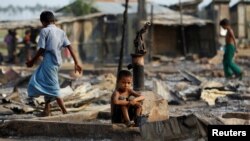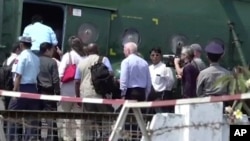A U.N. investigator warns Myanmar's unprecedented level of human rights violations and abuses against its people will not end without concrete action by the international community against the government and military authorities. The special rapporteur on the situation of human rights in Myanmar submitted her report to the U.N. Human Rights Council.
In a blistering report to the council, investigator Yanghee Lee notes more than 10 months have passed since violence by the Myanmar military against the Rohingya minority in Rakhine state forced 700,000 to flee to Bangladesh. And, yet, she says, nothing has been done. That, despite credible evidence that widespread and systematic attacks continue against the Rohingya, possibly amounting to crimes against humanity.
"Far too many alleged crimes have been committed and have been documented and reported with scant consequences faced by those who perpetrated them…On ensuring accountability for gross violations of human rights and serious violations of international humanitarian law in Myanmar, we must admit that so far, the United Nations and the international community have failed - once again," said Lee.
The U.N. investigator acknowledges the primary responsibility for looking into allegations of gross violations lies with the state concerned. But, she notes none of the investigations established by Myanmar's government or military has met the standards of international law. She also questions the credibility of a recently established inquiry set up by the government to address the situation in Rakhine.
"This is the sixth domestic inquiry to be set up under the Aung San Suu Kyi-led government and no inquiry yet effectively holding perpetrators to account," said Lee.
Lee says the best way to obtain impartial, credible and independent findings is for the government to grant her access to the country and to allow the fact-finding mission established by the council to do its job.
The permanent secretary of Myanmar's foreign affairs ministry was not swayed by these arguments. U Myint Thu showed his animus toward Yanghee Lee by calling on the U.N. council to replace her with another special rapporteur. He says his government will not cooperate with Lee because she lacks objectivity and that her assessments of the situation in his country are neither impartial nor balanced.
Rohingya have been denied citizenship, even though many of their families have lived in Myanmar for generations. Myanmar denies accusations of ethnic cleansing.








